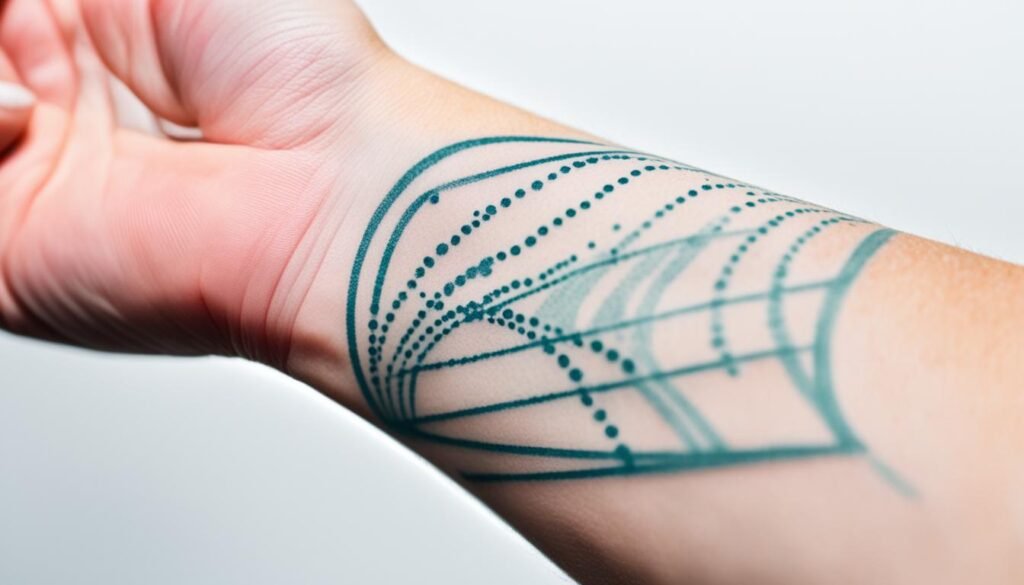Getting a tattoo can be a painful process, but numbing creams can provide some relief. While numbing creams do not completely eliminate the pain, they can significantly reduce it, making the tattooing process more comfortable for clients. However, it is important to use high-quality numbing creams and follow proper application procedures to avoid any negative effects on the tattoo’s visual outcome.
Numbing creams work by blocking nerve signals in the skin, and they can come in the form of creams, gels, or sprays. The active ingredients in numbing creams include nerve deadeners, nerve blockers, and vasoconstrictors, each providing a different level of pain relief. It is crucial to communicate with your tattoo artist about your intention to use numbing cream and to choose a reputable brand that will not interfere with the tattoo ink.
Proper application involves cleaning the skin, applying a thick layer of cream, covering it with cling wrap, and allowing it to sit for a specific duration. After the numbing effect wears off, the tattooing process may become more uncomfortable, especially for larger designs or longer sessions. It is essential to have open communication with your tattoo artist regarding the use of numbing creams.
Key Takeaways:
- Does numbing cream affect tattoo healing
- Numbing creams can significantly reduce the pain during the tattooing process.
- High-quality numbing creams should be used to avoid any negative effects on the tattoo’s visual outcome.
- Proper communication with your tattoo artist is crucial when using numbing cream.
- Follow the recommended application procedures for optimal results.
- After the numbing effect wears off, the tattooing process may become more uncomfortable.
Benefits of Using Numbing Cream for Tattoos

Using numbing cream during the tattooing process can offer numerous benefits for both clients and tattoo artists. One of the most significant advantages is its ability to provide effective pain relief, making it an ideal solution for clients with low pain tolerance. Numbing creams work by reducing surface pain and blocking nerve signals in the skin, allowing individuals to endure the tattooing process with greater comfort.
Tattoo artists also benefit from the use of numbing creams as they help create a more relaxed and controlled environment. By minimizing pain and discomfort, numbing creams prevent clients from flinching or moving during the tattooing process, allowing artists to work with greater precision and ease.
An important consideration when using numbing creams is their potential impact on the visual outcome of the tattoo. However, when high-quality numbing creams are used, they do not generally affect the final appearance of the tattoo. It is crucial to communicate with your tattoo artist about the use of numbing cream so they can make any necessary adjustments during the tattooing process.
Some numbing creams also contain additional ingredients like Vitamin E and aloe vera, which can aid in the healing process of the skin. These ingredients have anti-inflammatory and soothing properties, promoting faster healing and reducing redness and swelling associated with new tattoos.
Overall, numbing creams provide significant benefits for pain management during tattoo sessions without compromising the quality of the final tattoo. By using high-quality numbing creams and following proper application techniques, clients can have a more comfortable tattooing experience, and tattoo artists can create their best work.
Considerations Before Using Numbing Cream for Tattoos
Before you decide to use numbing cream for your tattoo, there are a few important considerations to take into account. Understanding these factors will help you make an informed decision and ensure a positive tattoo experience.
Tattoo Artist Comfort and Preferences
It is essential to consider that not all tattoo artists may be comfortable using numbing creams. In the tattoo industry, pain is often seen as a traditional part of the process and a rite of passage for clients. Some artists may have had negative experiences with certain numbing products or simply prefer not to use them. To ensure a harmonious and respectful relationship with your tattoo artist, it is crucial to have open communication and respect their preferences. Discussing your intentions and concerns beforehand will help establish trust and collaboration.
Tattoo Quality and Visual Outcome
Not all numbing creams are created equal, and using low-quality or counterfeit products can have adverse effects on your tattoo’s final appearance. To maintain the highest tattoo quality, it is vital to research and choose a reputable numbing cream brand. Your tattoo artist, with their expertise and experience, can recommend reliable options that won’t interfere with the tattooing process or compromise the visual outcome. Investing in a high-quality numbing cream ensures a safe and satisfying tattooing experience.
Alternatives to Numbing Cream
If your tattoo artist is not comfortable using numbing creams or if you prefer not to use them, there are alternative methods to manage pain during the tattooing process. Numbing sprays, mental preparation, and breathing techniques can all help alleviate discomfort and minimize pain sensations. Discussing these options with your tattoo artist will help determine the best approach for your specific needs and preferences.
Make an Informed Decision
Ultimately, the decision to use numbing cream for your tattoo is a personal one. By considering your tattoo artist’s comfort and preferences, the impact on tattoo quality, and alternative pain management methods, you can make an informed choice. Remember, open communication and collaboration with your tattoo artist will ensure a comfortable and successful tattooing experience.
| Considerations Before Using Numbing Cream for Tattoos |
|---|
| Tattoo Artist Comfort and Preferences |
| Tattoo Quality and Visual Outcome |
| Alternatives to Numbing Cream |
| Make an Informed Decision |
Tips for Using Numbing Cream for Tattoos
To ensure an optimal experience when using numbing cream for tattoos, follow these specific tips and guidelines:
- Start by cleaning the area of the skin where you will be tattooed to remove any dirt and oil. This ensures proper adhesion of the numbing cream and prevents any interference with the tattooing process.
- Apply a thick layer of numbing cream to the tattooed area, ensuring full coverage. Use gentle, circular motions to massage the cream into the skin for better absorption.
- Once applied, cover the cream with cling wrap or a sterile cheesecloth-like material. This helps to create a barrier and prevent the cream from evaporating too quickly.
- Allow the numbing cream to sit on the skin for the recommended duration mentioned on the product packaging. It is important not to exceed the recommended time as this may impact the healing process and make the skin overly sensitive.
- Before starting the tattooing process, your tattoo artist will wipe off the cream with a damp cloth to ensure a clean canvas. This step allows the ink to penetrate the skin effectively.
- After the tattooing process is complete, carefully follow your tattoo artist’s aftercare instructions for optimal healing. Cleanse the tattooed area gently and apply any recommended ointments or moisturizers to promote proper healing.
- It is important to note that leaving the numbing cream on for longer than necessary does not extend the numbing effect and can potentially make the skin more sensitive.
- Remember to communicate with your tattoo artist about the numbing agent you are using. Be transparent about your application process and any concerns you may have. This open dialogue ensures a smooth tattooing process and a successful healing outcome.
Follow these tips when using numbing cream for tattoos to have a more comfortable tattooing experience. Proper numbing cream application, along with effective pain management, tattoo healing, and tattoo aftercare, contribute to a successful and enjoyable tattoo journey.
Conclusion
Numbing creams can be an effective tool for managing tattoo pain and providing relief during the tattooing process. By blocking nerve signals in the skin, numbing creams significantly reduce discomfort, making the experience more comfortable for individuals with low pain tolerance. However, it is crucial to choose high-quality numbing creams and follow proper application procedures to ensure optimal results.
When using numbing creams, it is essential to communicate openly with your tattoo artist. They can provide guidance on reputable brands that will not interfere with the tattoo ink, ensuring a successful outcome. Proper application involves cleaning the skin thoroughly, applying a thick layer of cream, covering it with cling wrap, and allowing it to sit for the recommended duration.
After the numbing effect wears off, it is normal to experience some discomfort during the tattooing process. Following your tattoo artist’s aftercare instructions is crucial for optimal healing. Numbing creams can be a valuable tool in managing tattoo pain, but it’s important to rely on the expertise and recommendations of your tattoo artist to make informed decisions about their use.
Does numbing cream affect tattoo healing?
Can numbing cream completely eliminate tattoo pain?
What are the active ingredients in numbing creams?
Can numbing creams affect the visual outcome of a tattoo?
Are there alternatives to numbing creams for managing tattoo pain?
How should numbing cream be applied for tattoos?
Can numbing cream be left on for longer to prolong the numbing effect?
Forhad
Forhad's writing is not just about the artistry of tattoos or the latest trends in the industry; it's an exploration of the deep-rooted connections people have with their tattoos, reflecting personal narratives, cultural histories, and moments of transformation. Through a mix of in-depth features, personal narratives, and insightful analyses, he sheds light on the multifaceted nature of tattooing, revealing the emotional and cultural layers that lie beneath the surface.








